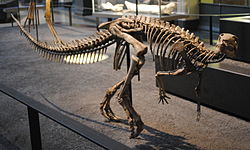Dysalotosaurus
|
Dysalotosaurus Temporal range: Late Jurassic, 152–151 Ma |
|
|---|---|
 |
|
| D. lettowvorbecki skeleton in Berlin | |
| Scientific classification | |
| Kingdom: | Animalia |
| Phylum: | Chordata |
| Class: | Reptilia |
| Clade: | Dinosauria |
| Order: | †Ornithischia |
| Suborder: | †Ornithopoda |
| Family: | †Dryosauridae |
| Genus: |
†Dysalotosaurus Virchow, 1919 |
| Species: | †D. lettowvorbecki |
| Binomial name | |
|
Dysalotosaurus lettowvorbecki Virchow, 1919 |
|
Dysalotosaurus (meaning 'uncatchable lizard') is a genus of herbivorous iguanodontian dinosaur. It was a dryosaurid iguanodontian, and its fossils have been found in late Kimmeridgian age-rocks (Late Jurassic) of the Tendaguru Formation, Tanzania. The type species of Dysalotosaurus is D. lettowvorbecki. D lettowvorbecki was named by Rudolf Virchow in 1919 after the Imperial German Army Officer, Paul von Lettow-Vorbeck. It has long been referred to approximate contemporary Dryosaurus but newer studies reject this synonymy.
Dysalotosaurus was a precocial dinosaur, which experienced sexual maturity at ten years, had an indeterminate growth pattern, and maximum growth rates comparable to a large kangaroo.
In 2011 paleontologists Florian Witzmann and Oliver Hampe from the Museum für Naturkunde and colleagues discovered that deformations of some Dysalotosaurus bones were likely caused by a viral infection similar to Paget's disease of bone. This is the oldest evidence of viral infection known to science.
...
Wikipedia
